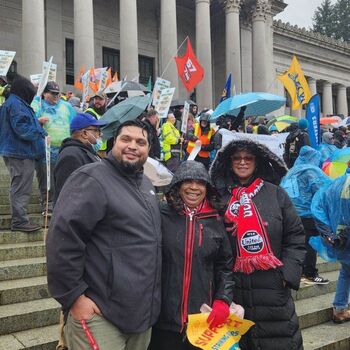We're winning funding for ESPs and Special Education

This morning at 2am the House passed SB 5882 with about $60 million in funds for ESP staffing and just now the Senate passed HB 2180 to raise the cap on Special Education funding. In other words, all our emails, lobby visits, rallies, and more worked and we are making progress on our priority issues.
What passed off the floor of both chambers – Differences will need concurrence next week
- Increased paraeducator staffing (SB 5882) includes about $60 million in additional funding to support more paraeducators, office support, and non-instructional aides. This funding will be included in the allocation starting this school year (2023-24). This goes to the Senate for concurrence.
- Raising the cap on Special Education funding (HB 2180) gives districts the ability to apply the Special Education funding multiplier to 16% of students, up from the current cap of 15% of students. More Special Education students will now have funding for the supports they need. This bill will go back to the House for concurrence.
- Inclusive materials in schools (SB 5462) will ensure students have access to materials and learning that includes LGBTQIA+ individuals. This bill will go back to the Senate for concurrence.
- Paraeducator Fundamental Course of Study (HB 1277) clarifies the requirement for in-person PD and provides additional guidance and rules around PD for paraeducators. This bill is headed back to the House for concurrence.
- Protecting students’ freedom to learn by creating clear processes and procedures required before book removal (HB 2331) will protect materials from arbitrary censorship. This bill is headed back to the House for concurrence.
- Fentanyl and substance-use education (HB 1956) adjusts the standards for middle and high school health/PE to include fentanyl. This bill is headed back to the House for concurrence.
- Adjunct faculty access to the Public Service Loan Forgiveness program (HB 1950) has been signed into law by the governor. It counts non-instructional hours toward the calculation of hours worked for the purposes of determining PSLF eligibility.
- Retiree Plan 1 Cost of Living Adjustment (HB 1985) also passed. This bill will be delivered to the Governor soon for his signature.
What didn’t make it
- Unemployment insurance for striking workers (HB 1893)
What to expect next week
- Concurrences – The House and Senate will reconcile any differences between the versions of bills that have passed off of each floor.
- Budgets are the last big things that are left to do after today. Educators will continue to communicate with our legislators to stress the importance of funding our schools and colleges.
- Capital budgets have major differences and negotiations are underway. The House and Senate are far apart in their approaches to school capital construction, particularly related to the School Construction Assistance Program. The Senate makes meaningful increases in the square foot allotment, while the House proposes to do away with the program altogether in favor of a grant process. WEA and other K-12 stakeholders have advocated for the Senate approach. Both Chambers include money for indoor air quality and HVAC improvements in schools ($55 million in the House proposal; $40 million in the Senate.) We’ll be watching closely as they negotiate.
- Session will end March 7th. If budgets aren’t resolved and passed, it’s possible that the Governor would extend the session, though at this point it seems very unlikely.
Revenue corner: Looking forward
As 2024 legislative session comes to a close, we are looking at the long game to raise the revenue our schools and public services need. The next step is defending the capital gains tax on the ultra-wealthy. Stay tuned as we talk with colleagues and neighbors about how important it is to maintain the capital gains tax.
